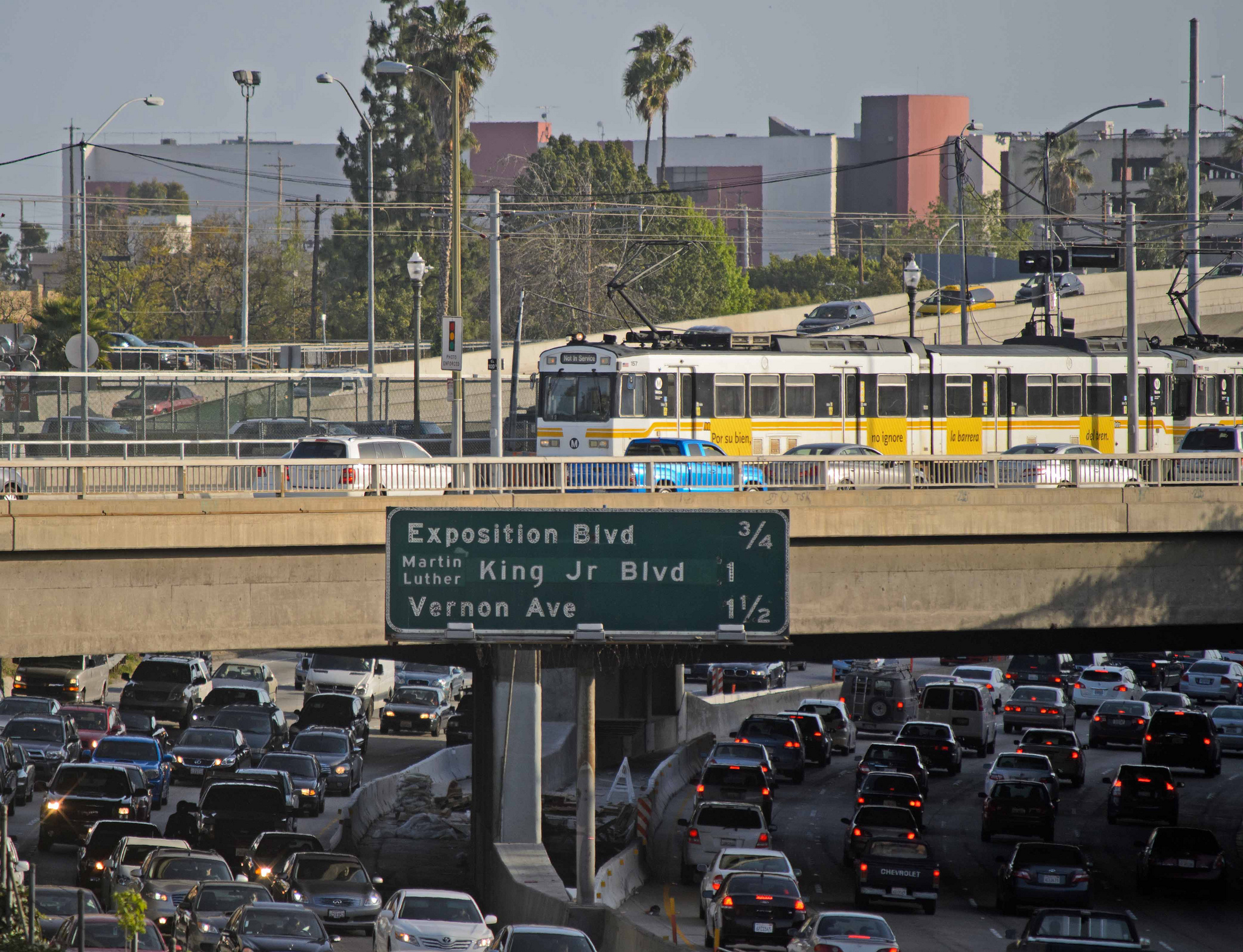Navigating classes and traffic as a UCLA commuter student

Automobile traffic on the I-110 near USC. The Purple Line extension, a subway line that would connect the campus to the Metro rail network, is not expected to be completed until 2035. (Creative Commons photo by estebanandjulie on Flickr)
By Daily Bruin Staff
Nov. 18, 2015 3:04 p.m.
The first half of a series
Some people nap in Powell. Some people nap in class. For me, my favorite place to sleep is deep underground, in Parking Structure 7.
I curl up in the back of my midsize SUV, having stashed a sleeping bag and pillow there since week one. The occasional honk and sound of locking cars used to wake me up, but no longer. On Thursday afternoons, catch me in my disappearing act underground, emerging re-energized, and ready to take on the horrors of an organic chemistry lab section starting at 6:30 p.m.
If you happen to see me, I probably look like I’m homeless, but nope; I’m just a commuter.
As a student commuting from Culver City, going back home in the middle of the day isn’t really an option. Most days, I spend at least eight hours on campus, and that often stretches into 10 or 12. Like 20 percent of UCLA students, I commute, planning my life around Los Angeles traffic. Unlike many, at least I have a car, and my commute doesn’t need to include a major freeway.
The stories of commuters range in terms of reasoning, duration and distance. Some are L.A. natives who spent a year or two on the Hill or in the apartments before moving back home. Demont Repulse, a fourth-year sociology student, cites needing to care for his younger siblings in light of his mother’s medical issues as a major motivator for moving back to his hometown of Compton. If money were not an issue, however, he’d move back to Westwood in a heartbeat.
For many, financial concerns have been a primary driver in deciding to commute. Sure, it means those drunken Thursday night strolls back to the Hill or to your North Village apartment will come to an end, or perhaps never come to fruition, but the cost of living in Westwood is currently pegged as $12,264 for housing and personal expenses for off-campus students and $16,834 for students living on campus. Obviously, this isn’t chump change.
If you’re in the greater Los Angeles area and you want to save at least $12,000 a year in loans or funds from a family member’s bank account, it makes a lot more sense to surrender a little part of your day to traffic.

Tiffany Nguyen, a fifth-year English student, drives from Orange County almost daily, spending sometimes two hours just going one way to class. Contrary to popular belief, Nguyen feels like her commuting has helped her extracurricular involvement, but she still consolidates her classes to a few days a week. Another commuter, Shana Nazarian, a third-year history transfer student, is already transitioning out of the lifestyle. Nazarian intends to move to Westwood next quarter, having recently secured a sublease for winter quarter.
Even more arduous are the long-haul commutes of those without cars. Lizbeth Flores, a fifth-year sociology student, spends two hours each way taking the 720 bus and walking from her home in Boyle Heights. Flores feels that North Campus majors can cope better with commuting, having experienced commuting previously as an applied math major. “You can do your readings on the bus, or listen to lectures. With math, you have to be really focused, and sit down (to do problem sets),” she said. I agree, since commuting this past quarter while taking two chemistry classes has been a taxing and stressful experience.
Regardless of the reasons or methods for commuting, those living the commuter life share common struggles. If you forget a homework assignment at home, you had better hope you had saved it in three different places, or you’re most likely out of luck in terms of submitting it on time. Stacked classes are efficient, but tiring, and having spread-out classes means trying to make the most of those awkward gaps.
Social class and age are the primary dividing lines between students living on or nearby campus and those commuting longer distances. In my experience, friends usually complain of doing laundry or finding time to feed themselves, but often commuters like Demont and I deal with responsiblities at home. This is indicative of how sometimes it isn’t a difference in age, but rather maturity.
For the more than three-quarters of the student population that doesn’t commute beyond south of Wilshire Boulevard, the life of a commuter is often an abstract concept. Fighting traffic, navigating the privilege and burden of having a car in Westwood, and oftentimes, negotiating a trade-off between immersing oneself in college life and family life, are real issues.
There’s no other way to cut it: Commuting sucks. For most students that do so, it’s a financially pragmatic decision that places pressure on other factors, adversely affecting quality of life.
Next week: how commuting affects students’ social and academic lives, and what, if anything, UCLA or the city can do.


